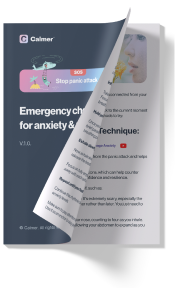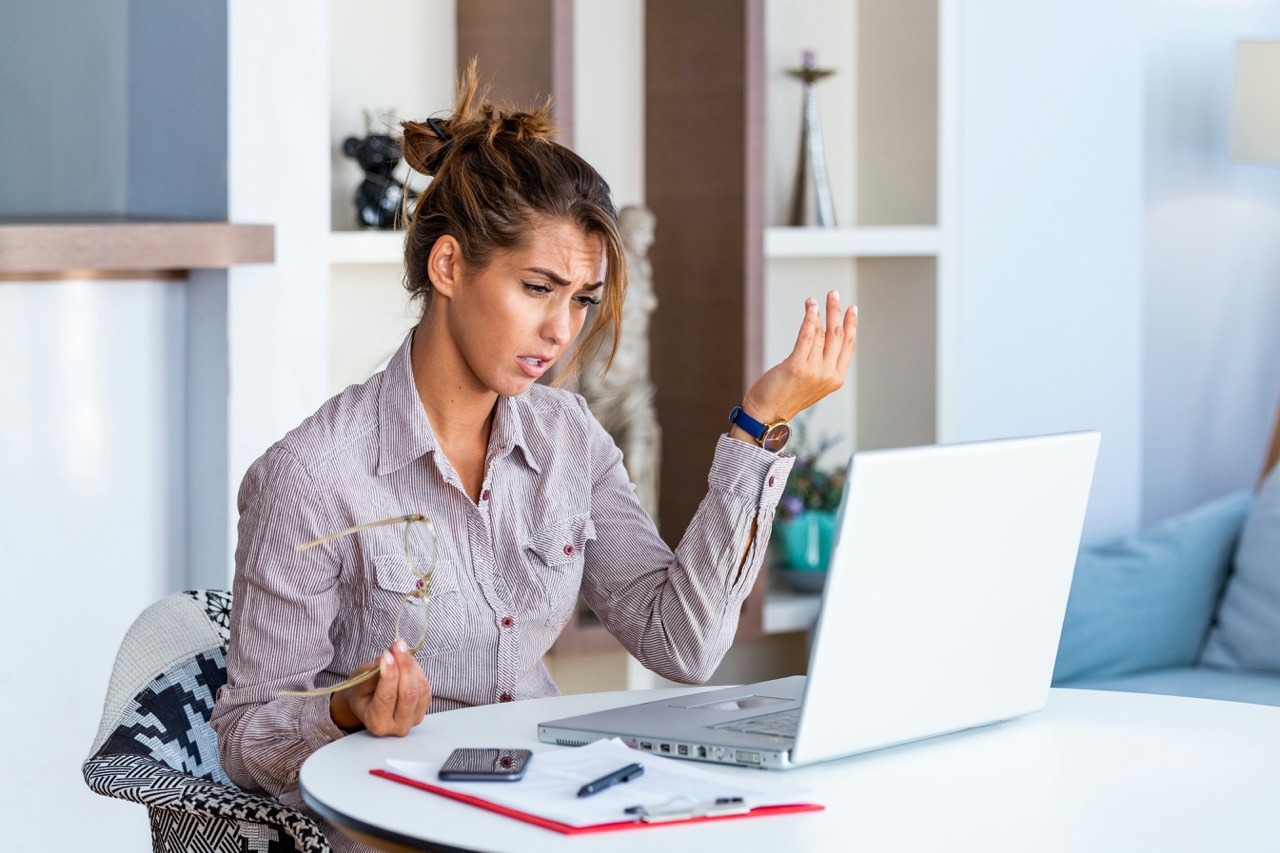The content provided on this page is for informational purposes only and is not intended to be medical advice. If you are experiencing symptoms of an anxiety disorder, please consult a psychiatrist, therapist, or healthcare professional. Find a mental health professional to help you choose the best anxiety and panic treatment strategy. This page is not a substitute for professional medical diagnosis or treatment.
Feeling a panic attack coming on? Here’s what to do ASAP:
Acknowledge: (Click to learn more)
Recognize and accept that you’re experiencing a panic or anxiety attack as a crucial first step in dealing with it effectively.
- Inhale slowly through your nose for 4 seconds
- Hold your breath for 2 seconds
- Exhale slowly through your mouth for 6 seconds
- Repeat until you feel calmer
- Look around and name 5 things you can see
- Touch 4 different textures around you
- Listen for and identify 3 distinct sounds
- Take note of 2 scents in the air
- Focus on 1 thing you can taste
- Go for a short walk or do some light stretching
- Release tension by gently rolling your shoulders or massaging your temples
- Engage in a simple task like organizing your desk or folding laundry
- Listen to calming music or a guided meditation
- Call or text a friend or family member you trust for support
- Contact a mental health hotline or crisis support line for immediate assistance
- In the US, there’s the Panic Attack Hotline (Call 1-800-662-4357 or text 741741). In the UK, there’s No Panic (0300 772 9844)
- You can also contact your local hospital, GP, or health services center, which can connect you with someone who can help
When Should I go to the Emergency Room or Call an Ambulance?
If you’re having a severe panic attack and you’re unsure about calling an ambulance, keep these in mind:
- Unfamiliar Symptoms: If your symptoms seem serious and you haven’t seen a specialist, get emergency help
- First Panic Attacks: If it’s your first panic attack, go to the ER for a checkup
- Prolonged Duration: If your panic attack lasts longer than 30 minutes, seek emergency care
- Try doing things that help you relax, like going for a walk, doing a hobby you enjoy, or hanging out with people you love
- Eat balanced meals, exercise regularly, and make sure to get enough sleep. Cut back on stuff like coffee, alcohol, and smoking ’cause they can make anxiety worse
- Practice simple tricks to calm yourself down, like taking deep breaths, meditating, or doing yoga
- Figure out what makes you anxious and try to avoid those things (and people) as much as you can. It can help keep your anxiety from acting up (certain environments, situations, or people)
Click here to download this guide and print it out if needed.
Acknowledge
When I had a panic attack for the first time, I didn’t even know what was going on. I was freaking out big time.
My heart was racing like crazy, I could hardly breathe, and I felt like the world was closing in on me. It was terrifying, to say the least.
At first, I tried to brush it off, thinking maybe it was just a fluke or something I ate. But as it kept happening, I realized I needed to face it head-on.
Admitting to yourself that you’re having an attack is the first step in dealing with it. Panic attacks happen to lots of people, and it’s okay to go through them.
Accepting that I was having a panic attack wasn’t easy. I felt embarrassed and ashamed, like I was somehow failing at handling my own emotions.
But let me tell you, once you recognize what’s happening, you can start doing things to help yourself feel better.
Breathe Deeply
When you feel a panic attack coming on, one of the first things you should focus on is your breathing.
Deep breathing techniques regulate your body’s response to stress and can calm you down in minutes.
Inhale slowly through your nose for 4 seconds:
Take a slow, deep breath through your nose, counting to four as you inhale. Focus on filling your lungs with air, allowing your abdomen to expand as you breathe in.
Hold your breath for 2 seconds:
Once you’ve inhaled fully, pause and hold your breath for a count of two. This brief pause allows you to fully oxygenate your body and helps regulate your breathing pattern.
Exhale slowly through your mouth for 6 seconds:
Now, exhale slowly and steadily through your mouth, counting to six as you release the breath.
Focus on fully emptying your lungs, allowing any tension or stress to melt away with each exhale.
Repeat until you feel calmer:
Continue this rhythmic breathing pattern until you notice a drop in your anxiety levels.
Make sure to pay attention to your breath as it enters and leaves your body. Use it as an anchor to stay present in the moment.
Apps like Calmer can also help because they have all the tools you need, like breathing exercises and grounding techniques, available in one place.
This saves time by giving you instant access to the support you need during a crisis.
When using mental health apps like Calmer, it’s best to explore them first. Check out their features and choose the one that feels right for you in that moment.
Ground Yourself
During a panic or anxiety attack, you’ll inevitably feel disconnected from your surroundings or overwhelmed by intense emotions.
Grounding techniques can help bring your focus back to the current moment and give you a sense of stability. Here are some methods to try:
5-4-3-2-1 Technique:
The 5-4-3-2-1 Method: A Grounding Exercise to Manage Anxiety
Look around and identify:
- 5 things you can see
- 4 things you can touch or feel
- 3 things you can hear
- 2 things you can smell
- 1 thing you can taste
Focusing on your surroundings distracts you from the panic attack and helps your body and mind relax faster.
You can also try calming down with affirmations, which can help counter negative thoughts and instill a sense of confidence and resilience.
Repeat reassuring statements to yourself, such as:
- “I am safe and in control”
- “This feeling will pass, and I will be okay”
- “I have the strength to overcome this challenge”
Remember, a panic attack can’t kill you! It’s extremely scary, especially the first time you feel it, but it will pass sooner rather than later. You just need to find the strength to ride it out.
Move Your Body
When you’re freaking out with a panic or anxiety attack, your body can get all tense and knotted up, adding to the stress. Here are some simple ways to relieve panic attacks:
Let it Out: Moving around can help you shake off some of that pent-up tension and stress that’s making you feel like a coiled spring.
Take a Stroll: Go for a short walk around the block. Focus on the sights and sounds around you, and let the fresh air do its thing.
Stretch it Out: Do some simple stretches to loosen tight muscles. Reach for the sky, touch your toes, whatever feels good.
Shoulder Rolls:
- Sit or stand up straight
- Roll your shoulders forward and backward a few times
- Let your arms hang loose and feel the tension melt away
Temple Massage:
- Use your fingertips to gently massage your temples
- Move your fingers in small circles and take slow breaths
- Feel the tightness in your temples ease up with each massage
Distract Yourself
Apart from grounding yourself or lightly exercising and stretching, there are many other ways you can distract yourself.
The most important thing is to find ways to shift your focus away from the intense feelings, calm your mind, and bring you back to the present moment.
Here are some no-frills activities you can try:
Organize Your Space:
Take a moment to tidy up your surroundings, whether it’s your desk, your room, or even just a cluttered corner.
Focus on sorting through papers, straightening up shelves, or folding laundry. Organizing can give you a sense of control and achievement and distract you from anxious thoughts.
Listen to Calming Music or Guided Meditation:
15 Minute Panic and Anxiety Attack Talk Down, Guided Meditation Relaxation and Soothing Rain Sounds
Put on some soothing music or find a guided meditation that resonates with you. Close your eyes and focus on the music or the voice guiding you through relaxation techniques.
Pay attention to the rhythm of your breath as you let the calming sounds wash over you. This will help quiet the mind and reduce anxiety.
Reach Out for Support:
Pick up the phone and call or text a trusted friend or family member who understands what you’re going through.
Share how you’re feeling with them and let them provide reassurance and support.
Sometimes, just hearing a familiar voice or receiving a comforting message can make a world of difference in calming your nerves.
Seek Professional Help
Contact a Mental Health Hotline or Crisis Support Line:
If you’re in immediate distress or crisis, don’t hesitate to reach out to a mental health hotline or crisis support line.
In the US, there’s the Panic Attack Hotline (Call 1-800-662-4357 or text 741741). In the UK, there’s No Panic (0300 772 9844).
You can also contact your local hospital, GP, or health services center, which can connect you with someone who can help.
Trained counselors are available to listen to your concerns, offer support, and provide guidance on coping strategies and resources.
They can help you go through the intensity of the moment and connect you with further assistance if you need it.
Organize an Appointment with a Therapist or Counselor:
Schedule an appointment with a licensed therapist or counselor who specializes in anxiety disorders or panic attacks.
In therapy, you’ll talk about what’s causing your anxiety, learn ways to deal with it and make a plan to get better.
Therapy is a place where you can talk about how you’re feeling without worrying about being judged. It’s a big step toward feeling better.
Consider Medication Options with a Psychiatrist:
If your anxiety is really bad, your therapist or doctor might suggest medication. Sometimes, meds and therapy together work best for treating panic or anxiety disorders. It’s like having a full toolkit to help you get better.
Important Things to Remember:
When panic or anxiety attacks become overwhelming or interfere with your daily life, reaching out to a mental health professional is excellent for getting valuable support and guidance.
Remember, seeking professional help is a sign of strength, not weakness. It’s okay to ask for support when you need it.
Taking proactive steps to address your mental health can lead to significant improvements, so don’t hesitate to reach out for help. You deserve to feel better.
When Should I go to the Emergency Room or Call an Ambulance?
If you’re experiencing a severe panic attack and you’re unsure whether to call an ambulance, consider this:
- Unfamiliar Symptoms: If your symptoms resemble serious medical conditions like chest pain or difficulty breathing, and you haven’t been evaluated by a specialist, err on the side of caution and seek emergency assistance. It’s better to be safe than sorry.
- First Panic Attacks: If this is one of your initial panic attacks, heading to the emergency room is advisable for a proper diagnosis. Without prior experience, you probably won’t be able to distinguish it from more serious health issues.
- Prolonged Duration: If your panic attack lasts longer than 30 minutes, it’s a good idea to seek emergency treatment. This could mean either you’re experiencing multiple attacks in a row, or there might be another health issue at play.
Change Your Lifestyle
Changing your lifestyle can play a significant role in preventing future panic and anxiety attacks.
Make Time for Relaxing Activities:
- Take some time each day to do things that help you chill out. Maybe it’s going for a walk, doing a puzzle, or hanging out with friends.
- Find hobbies or activities you enjoy, and make sure to do them regularly. Do what makes you happy, from playing video games and cooking to going for a bike ride.
- Spend time with people who make you feel good, such as friends or family. You need a support system you can rely on.
Stay Healthy:
- Eat good food that gives you energy and makes you feel good. Try to have a balanced diet with lots of fruits, veggies, and whole grains.
- Get moving! Even just going for a walk or dancing around your room can help boost your mood.
- Make sure to get enough sleep each night. It’s hard to deal with stress when you’re tired all the time.
- Cut back on stuff like coffee, alcohol, and cigarettes, as they can make anxiety worse.
Relax Your Mind:
- Take a few minutes each day to breathe deeply and clear your mind by sitting quietly, listening to calming music, or doing some simple stretching.
- Try out yoga or meditation. They’re great ways to relax your body and calm your mind, even if you’ve never done them before.
Identify and Minimize Triggers:
- Pay attention to things that make you feel anxious or stressed out. If something or someone is bugging you, try to avoid it or find ways to deal with it better.
- It’s okay to say no to stuff that makes you uncomfortable or stressed. Put yourself first and take care of your mental health.
By making these things part of your everyday routine, you can create a more chill and stress-free environment for yourself.
Consider This Too:
How Long do Panic Attacks Last?
Panic attacks typically last around 5 to 20 minutes, although they can vary in duration. Some may be shorter, lasting just a few minutes, while others may be longer, lasting up to an hour or more.
How Long do Anxiety Attacks Last?
Anxiety attacks, also known as anxiety episodes or anxiety flares, typically last between a few minutes to around 30 minutes.
However, some can persist for longer periods, lasting hours or even days in some cases.
What’s the Difference Between a Panic Attack and an Anxiety Attack?
| Panic Attack | Anxiety Attack | |
| Onset | Sudden and intense | Gradual |
| Duration | Typically short (5-20 minutes) | Variable (few minutes to hours) |
| Physical symptoms | Rapid heart rate, sweating, trembling, shortness of breath, chest pain, feelings of choking | Restlessness, muscle tension, difficulty concentrating, irritability |
| Emotional symptoms | Sense of impending doom or losing control | Worry, unease, tension |
| Trigger | Occurs unexpectedly or in response to specific triggers | Often triggered by stressors or situations that provoke anxiety |
| Peak intensity | Rapid onset and peak within minutes | May not have a clear peak, intensity varies |
| Recovery | Symptoms subside relatively quickly | Symptoms may persist for longer periods |
What Feels Similar to Panic and Anxiety Attacks?
Several conditions and experiences can feel similar to panic and anxiety attacks. Some of these include:
- Heart attacks
- Hypoglycemia (low blood sugar)
- Thyroid disorders
- Diabetes
- Sleep apnea
- Asthma attacks
- Generalized anxiety disorder (GAD)
- Post-traumatic stress disorder (PTSD)
- Electrolyte Imbalance
Seeking help from a professional is highly recommended if you’re experiencing panic or anxiety attacks.
A mental health professional, such as a therapist or counselor, can provide valuable support, guidance, and treatment options to help you understand and manage your symptoms.
They can work with you to develop coping strategies, explore underlying triggers or causes, and provide appropriate interventions to alleviate distress.
Additionally, a healthcare provider can rule out any underlying medical conditions and recommend medication or other treatments to help with symptoms.




